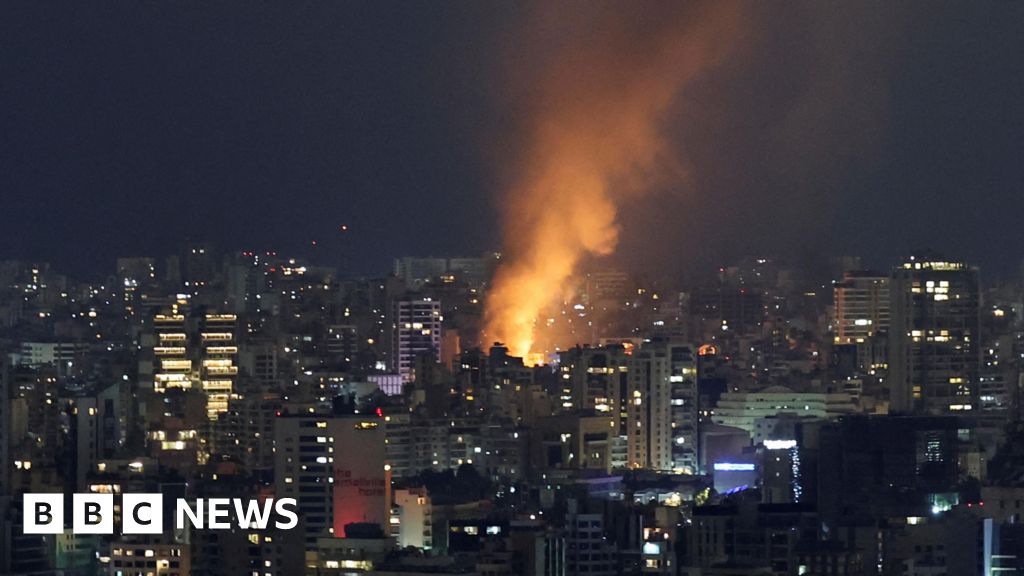
The Lebanese Ministry of Health said that 22 people were killed and 117 others were injured in Israeli air strikes on central Beirut on Thursday evening.
BBC reporters heard loud explosions at the site of the strikes in Al-Bashoura, a small Shiite area in the capital. Rescuers were seen digging through the rubble at the scene.
Ambulances transported many injured people to the American University Hospital.
Unconfirmed media reports indicated that the apparent target was Wafiq Safa, the son-in-law of assassinated Hezbollah leader Hassan Nasrallah and a high-ranking security official for the group. Hezbollah’s media office did not comment.
The Israeli raids hit residential buildings in the crowded neighborhoods of Al-Nuwairi and Al-Basta in Al-Bashoura.
These attacks came after two relatively quiet days in the Lebanese capital, something that seemed unusual after the intense strikes in recent weeks.
There was no advance warning, and the Israeli army did not comment.
This is the third time Israel has launched air strikes on the city outside the southern suburb of Dahiyeh, where it has launched repeated raids, killing Hezbollah leaders and destroying ammunition caches.
A woman outside the hospital, who did not want to give her name, said she was in the building next to the explosions.
She said the building that was hit was entirely residential, about four or five stories high. One of her relatives was receiving treatment for head injuries.
The Beirut attack came hours after two Indonesian peacekeepers were wounded in southern Lebanon when an Israeli tank fired on a watchtower, according to the United Nations.
The United Nations Interim Force in Lebanon (UNIFIL) said in a statement that a watchtower at a United Nations base in Naqoura was subjected to direct bombardment, leading to the death of peacekeepers.
UNIFIL is a peacekeeping mission established in 1978, to monitor hostilities and help ensure humanitarian access to civilians in southern Lebanon.
The United Nations said that Israeli forces “repeatedly bombed” UN sites during the past 24 hours. Israeli soldiers were also accused of deliberately shooting at cameras and lights at two other UNIFIL bases.
The Israeli army said that its forces opened fire from the area surrounding the base after ordering the base personnel to remain in “protected places.”
The United Nations said that the two peacekeepers were not seriously injured but were still in hospital, adding that the deliberate attacks on its peacekeepers were a “serious violation of international law.”
In a separate incident, Israeli soldiers opened fire on a base in Naqoura, “hitting the entrance to the bunker where the peacekeepers were taking shelter, and causing damage to vehicles and the communications system,” according to the United Nations.
An Israeli drone was also seen flying over the entrance to the bunker.
Also in Naqoura, Hezbollah said it fired missiles at Israeli soldiers on the ground and used guided missiles to destroy a tank heading toward the area, resulting in casualties.
There are now four teams of Israeli soldiers fighting inside Lebanon as it continues its ground operations against Hezbollah, which began on September 30.
A UNIFIL spokesman told the BBC on Thursday that the force was “concerned” and “deeply concerned” about Israeli army activity in the area where peacekeepers are stationed.
Andrea Tenenti said the sites struck by Israeli forces were well known as UN sites, adding that it would be important to have a discussion with Israeli authorities “to understand what happened.”
UNIFIL forces operate in southern Lebanon, between the so-called “Blue Line” – the unofficial border separating Lebanon from Israel and the Israeli-occupied Golan Heights – and the Litani River, about 30 kilometers (20 miles) to the north.
Last week, UNIFIL forces refused to leave their positions near the Blue Line after the Israeli army ordered them to do so.
There are about 10,000 UNIFIL military peacekeepers in Lebanon, from 50 contributing countries. There are also about 800 civilian employees.
Indonesia, home to the injured peacekeepers, provides UNIFIL with more than 1,200 soldiers, more than any other country.
The defense minister of Italy, which contributes more than 1,000 soldiers to UNIFIL, said the events were “unbearable” and must be “avoided carefully and decisively.”
The Israeli military said Hezbollah fired about 190 rockets from Lebanon at Israel on Thursday.
Earlier on Thursday, the Lebanese Ministry of Public Health said that an Israeli air strike on the village of Karak in eastern Lebanon killed four people and injured 17 others.
The Lebanese government says up to 1.2 million people have fled their homes over the past year.
Hostilities in the region have steadily escalated since Hezbollah began firing rockets into northern Israel on October 8, 2023, the day after its ally Hamas’ deadly attack on southern Israel, which killed about 1,200 people. Another 251 were transferred to the Gaza Strip as hostages.
Since October 7, nearly 42,000 people have been killed during the Israeli offensive in Gaza, according to the Hamas-run Health Ministry.

“Travel specialist. Typical social media scholar. Friend of animals everywhere. Freelance zombie ninja. Twitter buff.”





More Stories
Taiwan is preparing to face strong Typhoon Kung-ri
Israel orders residents of Baalbek, eastern Lebanon, to evacuate
Zelensky: North Korean forces are pushing the war with Russia “beyond the borders”